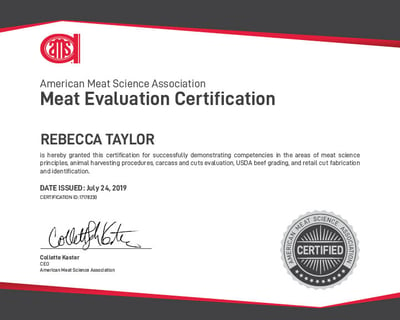CTE Curriculum
Prepare learners with CTE curriculum aligned to industry standards.
Case Study
"Meat"-ing the Demand
The Meat Industry Today
While the COVID-19 pandemic highlighted many glaring issues within U.S. society, perhaps one of the most potent pain points was the logistical issues that arose from the fractured supply chain. As Americans prepared for quarantine and stocked up on supplies, grocery stores began experiencing food shortages, especially meat and protein products. Due to the supply shortage, meat prices began to skyrocket, and the supply was even further limited when processing facilities across the U.S. shut down due to COVID protocols. As America has emerged from the most extreme effects of the pandemic, a greater emphasis has been put on food supply and the sustainability of the meat industry.
Despite lags in production in 2020, the meat industry saw a resurgence in 2021. According to Fortune Business Insights, the industry is expected to reach more than $215 billion by 2028, showing a strong 3.21 percent increase in compound annual growth rate. While slight variances are predicted between production rates among meat sources (beef, pork, chicken and turkey), the demand for high-quality protein sources is growing among American consumers. Additionally, the red meat sector is experiencing a surge in exports, primarily in Asian markets, with South Korea and China exports worth $2 billion and $1.49 billion, respectively.
The meat industry is not just essential for the food supply; it is also a leading source of employment for Americans across the country. The North American Meat Institute reported the meat industry employs more than half a million people. The largest source of jobs in the industry comes from animal processing and packing. According to the USDA Economic Research Service, the U.S. food and beverage manufacturing sector employed 1.7 billion people in 2019, one-third of which worked in meat and poultry plants. Specifically, more than 73 thousand employees work as slaughterers and meat packers, as reported by the Bureau of Labor Statistics (BLS). According to the BLS, another 142 thousand people are employed as butchers and meat cutters.
Emphasis on Education & Training

The growth of the industry has put increased pressure on educational institutions to provide more training opportunities for those interested in pursuing careers within the meat science industry. To meet this need, Mississippi State University has created a specialized meat science certificate program to expand training opportunities for students interested in the field. Within the program’s course options, students have the chance to take a class preparing for the American Meat Science Association (AMSA) Meat Evaluation Certification, hosted on the iCEV Testing Platform.
The certification validates knowledge and skills in meat carcass quality grading, meat handling and food safety, ensuring earners are better prepared to enter fields related to the meat industry. Led by Dr. Thu Dinh, associate professor at Mississippi State University, the course relies on the certification training materials offered by iCEV to prepare students for the AMSA Meat Evaluation Certification.
Offering the AMSA Meat Evaluation Certification as a course option has gained the attention of students across campus from various disciplines. “I think the [AMSA Meat Evaluation Certification] class is a really a unique course that creates the visibility for our meat science program and generates a lot of interest in other students,” said Dr. Dinh. Miles Beebe II was studying business and entrepreneurship at Mississippi State when he discovered an interest in meat science and processing. Spurned by his newfound passion, Beebe enrolled in the AMSA Meat Evaluation Certification course to increase his knowledge of the industry. “It [the AMSA Meat Evaluation Certification] helped me gain a better focus by learning not just the retail cuts but the evaluation part as well,” said Beebe.
Direct to Consumer Sales
The meat packing industry is primarily concentrated and has historically been dominated by large, corporations and companies. As reported by the White House, four meat packing companies control 85 percent of the beef market, while 54 percent of the poultry market is controlled by four processing firms, and 70 percent of the pork market is controlled by four processing companies. In an effort to drive competition in the meat industry, President Biden has issued new rules and $1 billion in funding to support independent meat processors.
While there was a growing movement of direct-to-consumer sales prior to 2020, the supply shortage due to COVID-19 expedited farm to table sales. According to Progressive Grocer, meat subscription box companies, such as ButcherBox and Omaha Steaks, saw month-over-month sales spike as high as 95 percent with 2020 year-over-year sales reaching nearly 800% during the height of the pandemic. While sales have petered and normalized, the demand for farm to table meat is growing.
This is good news for aspiring entrepreneurs like Beebe. After graduating with his bachelor’s degree, Beebe started working for the Mississippi State muscle biology lab with plans to one day open his own custom meat processing and shipping business. Beebe’s genuine passion for meat sciences shows his desire to provide more educational opportunities for the general public to learn about the origin source of common food products. He aims to provide high-quality products to consumers through his future business while expanding their knowledge of meat processing and retail cuts. “I think the education of the public would be a big factor because most people have no clue what actually happened during the processing,” said Beebe.
Looking to the Future
Whether a person is interested in pursuing meat science as a career, following a newfound passion or simply interested in learning more about where their food comes from, there is an ever-growing need for education and training opportunities in the meat science field. “I think this certification should be offered in all meat science programs,” said Dr. Dinh. “It allows students with different backgrounds to do the course at their own pace and understand a lot of things about processing.”
As consumers continue to demand high-quality, affordable meats, there is a reciprocal call for skilled workers in the meat science industry. Programs like Mississippi State are leading the way in meeting that demand by offering specialized certificate options and courses centered around industry certifications like the AMSA Meat Evaluation Certification.

Dr. Dinh receives the certification wall mount from iCEV representatives, Lonnie C. Johnson and Landee Thorn alongside Dr. Brown and Dr. Cleveland.
MISSISSIPPI STATE UNIVERSITY
STARKVILLE, TENNESSEE
About iCEV
Since 1984, iCEV has specialized in providing quality CTE curriculum and educational resources. iCEV is the most comprehensive online resource for CTE educators and students, offering curriculum for several major subject areas, including agricultural science, trade & industrial education, business & marketing, career exploration, family & consumer science, trade & health science, law enforcement and STEM education. iCEV also acts as a certification testing platform for industry certifications. Recognized companies and organizations utilize iCEV as the testing platform for their certifications. Additionally, iCEV offers Eduthings, a CTE data management platform that simplifies reporting for industry certifications, work-based learning, CTSO participation, and more. For more information, visit www.icevonline.com.




